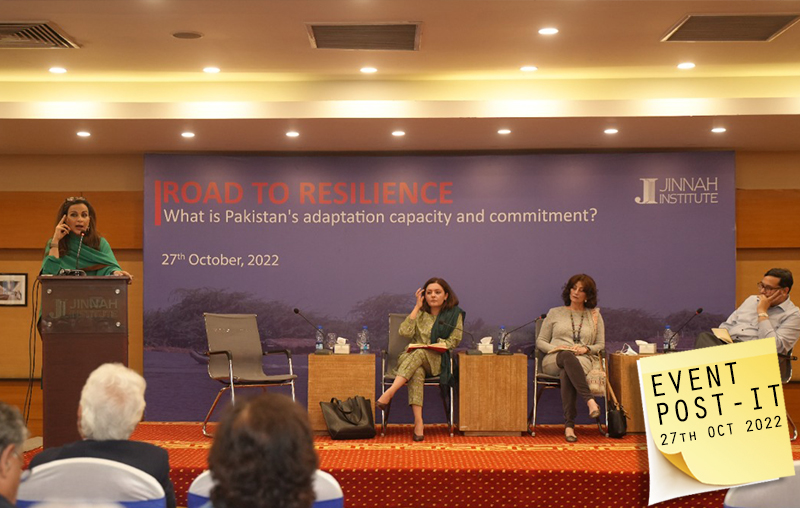POLICY EVENT
Road to Resilience: What is Pakistan’s adaptation capacity and commitment?
Date: October 31, 2022
ISLAMABAD: “Pakistan’s floods are a memo from nature itself for major emitters to realize that the catastrophe seen in Pakistan will not stay within our borders,” stated Federal Minister for Climate Change, Senator Sherry Rehman at Jinnah Institute’s conference titled ‘Road to Resilience: What is Pakistan’s adaptation capacity and commitment? ’ on 27th October, 2022. To enable resilience and secure a future for vulnerable communities, Pakistan will need to undertake a great deal of interprovincial coordination, financial support and executive synchronisation. Poor communities will not wait for international funding to trickle in, as they need to build back their lives and homesteads immediately. Unless we are realistic in our ability to assist them, they will be forced to spend this winter in the dark confines of extreme fragility, she stated.
In addition, she emphasized that development partners and international NGOs do not make realistic recommendations for governments. The roadmaps, plans and strategies created for climate action by development sector specialists are so far removed from the peculiar political economy of rehabilitation, that they are not useful for governments. “To be told that Pakistan should adopt a particular action comes at the tail end of many ‘shoulds’ that should have been incorporated, yet bear little sense of what is doable or possible,” she remarked.
Adil Najam, the inaugural dean of Pardee School of Global Studies, University of Boston observed that 27th COP Summit serves a reminder of how global diplomacy has failed to tackle climate challenges. He stated that the COP needed participation by vulnerable countries, but the rules of the game had to change fundamentally in their favour, otherwise COP will continue to be a forum for greenwashing and minimizing climate ambitions. He also stated that climate change should not be ‘fetishized’ as competition of disasters between nations. He emphasized that the debate on climate change needed an indigenous vocabulary, and be reimagined in ways that catered to vernacular forms of survival and existence.
Aisha Khan, Executive Director of Civil Society Coalition for Climate Change stated that Pakistan’s galloping demographic increase raised the question of whether we can continue with our current agricultural practices. To secure water, food and energy, it was imperative to consider whether Pakistan needed to grow its food, or simply find ways of importing it. Pakistan is ideally set up for tourism and trade, but our security paradigm only prioritizes strategic needs over the needs of the population. “To build true resilience, we need to ensure that learning is internalised, impact is maximised and innovation is incentivized,” she remarked.
Kashmala Kakakhel, climate finance specialist said Pakistan needs to change its narrative on climate change, and look at adaptation as an economic issue, not just a human and social cause. Having early warning systems can reduce climate catastrophe losses by 30%; for every dollar invested in adaptation, we save nine. Another rehabilitation measure we can take is ecosystem restoration as mangroves can be 1000 times cheaper than seawalls. The climate change story hinges on integrated water management and this is instrumental in building resilience, alongwith long-term planning.

